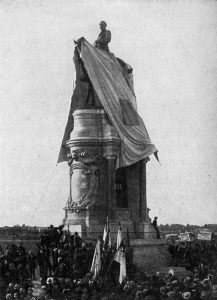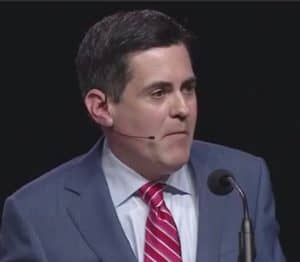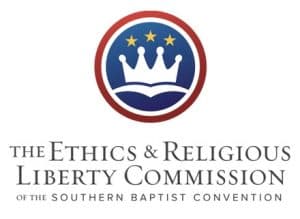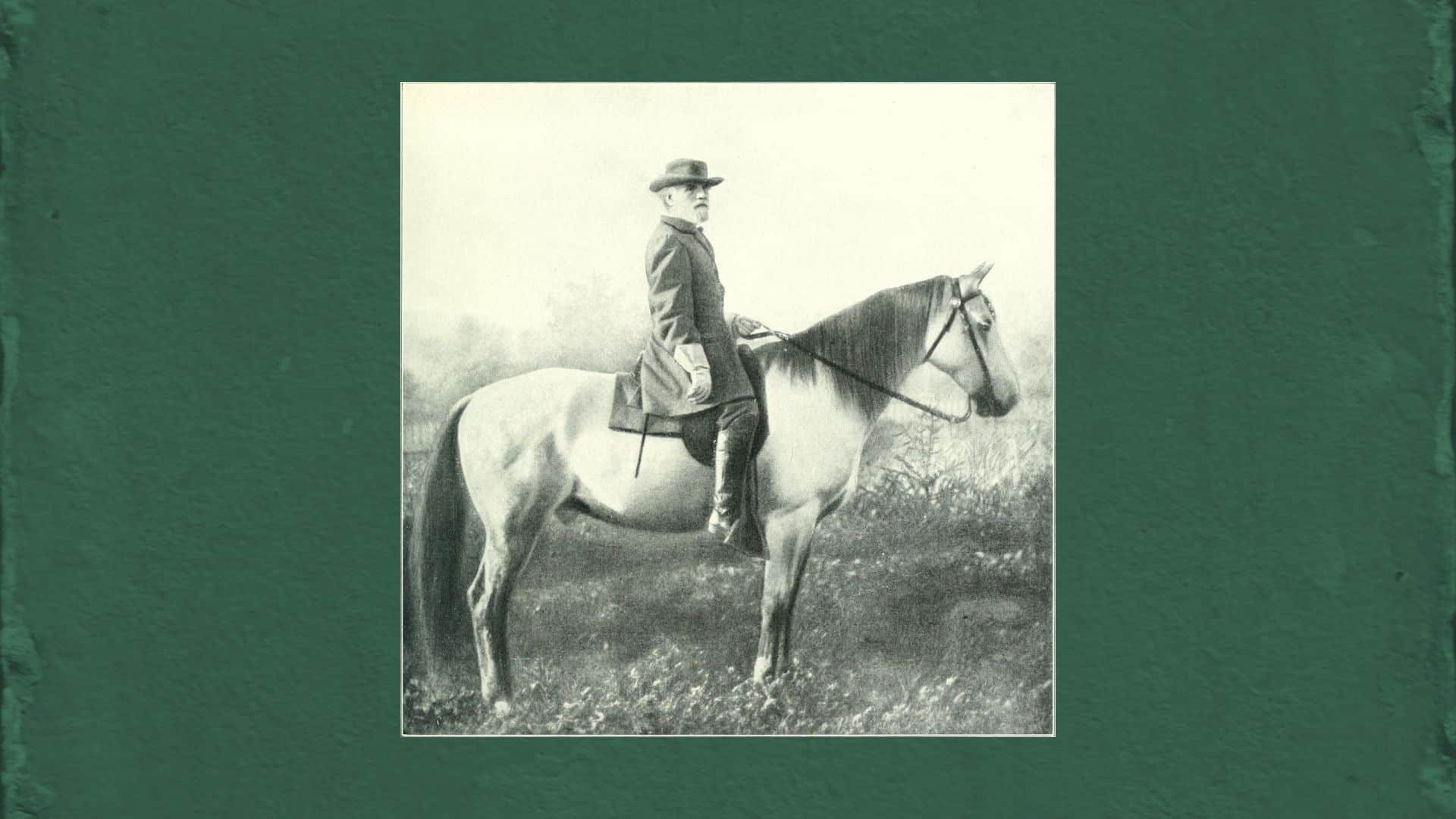Does the fact the General fought for the Confederacy keep us from learning any positive lessons from him? And if it does, what have we lost? And whose fault is it that we have lost it?
A land without memories is a people without liberty.
—Robert E. Lee—
Key point: When a country gets its history wrong, it will make bad decisions about its future. Thus, this post is just as much about America’s future as it is about its past.
You can access all the articles in this series from this page.
An unknown Confederate soldier wrote this about God’s answers to numerous requests he’d made in prayer.

I asked God for strength that I might achieve.
I was made weak that I might learn humbly to obey.
I asked God for health that I might do greater things.
I was given infirmity that I might do better things.
I asked for riches that I might be happy.
I was given poverty that I might be wise.
I asked for power that I might have the praise of men.
I was given weakness that I might feel the need of God.
I asked for all things that I might enjoy life.
I was given life that I might enjoy all things.
I got nothing that I asked for—
but everything I had hoped for…
Almost despite myself, my unspoken prayers were answered.
I am among all men most richly blessed.
Does this report of a devout man’s journey in prayer encourage you? Does it contain insights that give you hope? Does it help you see that often we, as short-sighted, finite human beings, seek what we believe to be good, only to find out later that had we gotten what we desired, we would have been deprived of something much better, or even of what was best?
If your answer to these questions is yes, I understand; because this soldier’s report on his prayer life, this “entry into his prayer journal,” is rich in spiritual insight and wisdom. Yet, if we were to treat this man’s testimony as elites and decision-makers are treating the rich lessons we might learn from well-known Confederate leaders (military leaders in particular), we would trash it thoroughly. Why? Because this soldier fought for the Confederacy, and in the minds of elites, having direct ties to the Confederacy make historical figures radioactive in every respect.

If there ever were a case of “throwing the baby out with the bathwater,” this is it. History is complicated. It is nuanced; but leftists do not care. They are anxious — even salivating — to paint with a broad brush everyone who was white who had any ties to the Civil War South or to slavery even before the Confederacy was formed. Apparently they also wish to eliminate public (and even private) acknowledgements that these people may have done anything positive.
Consider Generals Robert E. Lee and Stonewall Jackson. Never mind that Lee regarded slavery as an evil.1 Never mind that Jackson believed in treating blacks with dignity and respect. He held a regular Sunday school class for them and even broke the law to teach them to read and write! None of this matters to leftists.
Dr. Russell Moore is a great example of a leftist evangelical who apparently is ready to remove Robert E. Lee and everything about him from American history. Dr. Moore is the former president of the SBC’s Ethics and Religious Liberty Commission (ERLC) and currently director of the Public Theology Project at Christianity Today. Dr. Moore led the ERLC from 2013 until shortly before the SBC met in Nashville, Tennessee in June of this year.

Dr. Moore was thrilled to see the Robert E. Lee statue removed from its pedestal on Monument Avenue in Richmond, Virginia on Wednesday. September 8. The memorial to General Lee had been standing in its place since 1890. Dr. Moore’s article in Christianity Today is titled “Good Riddance to the Robert E. Lee Statue.” Dr. Moore appeared to frame his case for removing reminders of Lee’s past leadership in terms of being sensitive to those whose ancestors were oppressed by slavery or by the Confederacy in some other way. Racism and bigotry, however, were not unique to the South, by any means.
Moore’s disdain for Robert E. Lee is not surprising. Many might not know that Dr. Moore has been a professional Democrat, and even at the helm of the ERLC his actions and statements have tilted leftward, albeit often in subtle, yet significant, ways. Ironically, it is the Democrat party that has had a history of promoting slavery, Jim Crow laws, racism, and bigotry.
 We should realize that often Dr. Moore’s silence on a matter is as telling as statements he actually makes on other issues. According to a report released February 1 of this year, the ERLC has been a major reason some churches have withheld or reduced their giving to the Cooperative Program. The report cited numerous complaints directed at Moore and the ERLC, including the commission’s being “critical of protesters who stormed the U.S. Capitol but not of Black Lives Matter protests.”
We should realize that often Dr. Moore’s silence on a matter is as telling as statements he actually makes on other issues. According to a report released February 1 of this year, the ERLC has been a major reason some churches have withheld or reduced their giving to the Cooperative Program. The report cited numerous complaints directed at Moore and the ERLC, including the commission’s being “critical of protesters who stormed the U.S. Capitol but not of Black Lives Matter protests.”
Black Lives Matter is a Marxist organization that is set on destroying foundational tenets in America, and ultimately America itself. It and its leaders should be called out as such. I’ll have more to say about Marxist goals and leftists’ seeking to achieve them through BLM and other organizations next time, but first I want to invite you to watch this PragerU video. There are some things that ought to be abundantly clear about the calls to eliminate monuments to people who were leaders in a nation’s past. In this video, Douglas Murray, author of The Madness of Crowds, uncovers some of the most important ones. Here is a transcript of Murray’s presentation.
Ironically, thanks to the statue destroyers, the great figures of the past have never looked greater.
—Douglas Murray, in the Prager University video, “No Past, No Future—
Keeping Douglas Murray’s presentation in mind as we move along, let’s consider several different aspects to
-
-
- the calls for removal of monuments in America,
- the violence associated with the monuments, and
- the efforts that have been successful in getting the statues removed from the places they have stood, some of them, for many long years.
-
In the remainder of this post, we’ll highlight what history teaches about efforts to remove statues. In our next (and final) post in this series, we’ll expose leftists’ goals. The situation will call for all patriots to be alert and involved in preserving our republic. Are you ready?
With Does History Tell Us About Societies that Deface and Destroy their Monuments?
Jarrett Stepman, a historian and a contributor to The Heritage Foundation’s Daily Signal, was a guest on The Daily Signal Podcast on June 25, 2020. Stepman is author of The War on History: The Conspiracy to Rewrite America’s Past.2 On the program, Mr. Stepman observed that statue toppling occurred during the French Revolution. In that conflict, the violence, of course, wasn’t directed toward monuments alone — but also toward people. The Russian Revolution comes to mind as well. Generally speaking, “this situation where you have mass toppling of statues and attacks on statues generally tends to be a precursor to or follow up on a violent revolution. I think that’s what’s most common.”
This situation where you have mass toppling of statues and attacks on statues generally tends to be a precursor to or follow up on a violent revolution. I think that’s what’s most common.
—historian and author Jarrett Stepman—

Stepman goes on to discuss the situation in America in particular, and how leftists have been turning up the heat in society, stoking resentment and animosity, and pushing people toward violence, destruction, and even revolution.
History’s implications are clear. When a society starts defacing and destroying its historical monuments, this activity is like a canary in the coal mine. It is a warning that must call us to positive, constructive action.
In other words, if attacks on a country’s past are a precursor to or an indicator of revolution, this is definitely a time when clear heads and clear thinking must prevail. Respect for the rule of law is vital, and so is an emphasis on the good in America’s past. Be forewarned: One of the most effective ways the left has to stir up animosity and dissension is to emphasize — and reemphasize, and magnify — all that is bad, and that all is bad. It is doing all of these things; we’re hearing these messages everywhere.
But there are some really bad things in leftists’ pasts that these radicals would love for you to forget. Next time, we’ll talk about that, and we’ll expose the radicals’ agenda with regard to the statues.
What they want to do is anything but benign. It’s toxic.
I plan to release part 4 on Monday.
Copyright © 2021 by B. Nathaniel Sullivan. All rights reserved.
Notes:
1Lee condemned slavery in numerous statements, and I have taken these at face value. Actually, it is quite remarkable that the man who led the military forces of the Confederacy would call slavery “a moral and political evil” and say that he was “rejoiced that Slavery is abolished.” At the same time, in the interest of full disclosure, I would share that my research led me to this piece, titled “Robert E. Lee and Slavery,” by Elizabeth Brown Pryor. Pryor, who died in 2015, is the author of Reading the Man: A Portrait of Robert E. Lee Through His Private Letters. Pryor cites evidence that Lee’s views on slavery were not as anti-slavery as some of his statements make them appear at first blush. While my research uncovered no evidence that Pryor was a conservative, it also offered no evidence that she believed (as today’s leftist radicals do) in thoroughly trashing Lee because he didn’t hold views on the institution consistent with those of 21st-century Americans. Pryor apparently understands, as I’ve sought to contend in this series of articles, that history is complex, and that we cannot judge historical personalities based on or own day; we rather must assess them in light of theirs. Pryor concludes her article with these statements: “If you want to do Robert E. Lee justice, embrace the fine qualities that he truly has to offer us — and they are considerable — but also recognize his limitations and the injustices perpetrated at his hands. Then lend him your respect. It is the greatest compliment you can give him.”
2Stepman discusses his book, which had just been released, in the Daily Signal Podcast that aired on October 2, 2019.

Great and most needed post. Great Job!
Thank you, Oscar, for reaching out and for the encouragement! Blessings to you! —B. Nathaniel Sullivan